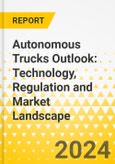Autonomous trucks, or Level 4 Robo-trucks, will revolutionize the transportation industry by enhancing road safety and meeting the rising demand for transport of goods and services from the boom of in e-commerce amid a driver shortage.
The trucking and commercial vehicles industry is facing an increasing shortage of truck drivers. What’s more, there is a need to mitigate road accidents and improve the efficiency of fleets, especially since the boom in e-commerce increases the need for the transport of goods and services.
This in-depth analysis equips stakeholders with the critical knowledge and foresight needed to navigate the burgeoning world of self-driving trucks.
- This report provides an analysis of the Technological landscape in Level 2-Level 4 Autonomous Driving technology: Unveiling the cutting-edge sensor suites, software and connectivity solutions powering autonomous commercial vehicles.
- How to overcome the Regulatory hurdles: Demystifying the complex global regulatory landscape in the U.S, China and Europe, highlighting key developments and potential roadblocks.
- Market outlook: Providing insights into regional adoption trends, key players, and investment opportunities.
- Challenges and opportunities: Identifying the critical challenges and potential benefits, including job displacement and infrastructure adaptations.
The “Autonomous Trucks Outlook” is a must-read for the Automotive industry, regulators, investors and other truck stakeholders
- Truck manufacturers and technology providers: Gaining invaluable insights into market trends and technological advancements to inform strategic decision-making.
- Logistics companies and shippers: Understanding the potential impact of autonomous trucking on their operations and supply chains.
- Investors and venture capitalists: Identifying promising investment opportunities in the rapidly evolving autonomous truck market.
- Policymakers and regulators: Informing policy decisions to ensure safe and responsible deployment of robotrucks.
- Uncertainty and misinformation: Auto2x cuts through the hype surrounding autonomous vehicles, providing clarity and reliable data.
- Lack of comprehensive insights: This report offers a holistic view, delving beyond technology to encompass regulations, market dynamics, and societal implications.
- Investment decision paralysis: Auto2x empowers stakeholders to make informed investment decisions with actionable insights and market forecasts.
By 2030, there will be a rise in demand for mobility services due to urbanization & e-commerce growth
- Rises in capacity of freight loads due to e-commerce growth: 20.7 billion tons of freight will be moved by trucks by 2028, a 36% increase from what was projected for 2017
- Shortage of drivers, aging driver workforce push for automation: In 2019, the U.S. had a shortfall of nearly 60,000 truck drivers
Emissions: Need for De-fossilization of truck powertrains to meet strict emission regulations
- Fuel efficiency is a key factor for viability. By 2030, hydrogen and fuel cells could fuel approximately 3.0 million to 4.0 million delivery trucks and vans globally
Safety: Towards zero-road deaths
- An automated system needs 0.1 seconds to react, compared to a professional truck driver who needs 1.4 sec, said Volkswagen. Highway autonomous driving is less complex to automate but the impact of an accident is more severe
- Consumer confidence in Autonomous Driving is higher than in cars: 1 in 4 Germans surveyed by Bosch and Innofact say that they have more confidence in an autonomous truck than in a human driver
Operating costs are crucial to viability
- Labor currently accounts for an estimated 35% to 45% of operating costs of road freight in Europe. The cost savings derived from a switch to driverless trucks are of keen interest
TuSimple has raised recently $350M to accelerate its Level 4 autonomous driving solution for the logistics industry and expand its autonomous freight network. Total funding raised to date $648 Million.
Waymo has signed an exclusive deal with FCA on self-driving commercial vehicles. Waymo has even partnered with Daimler trucks to build self-driving semi-trucks.
Plus.ai will produce up to 1,000 intelligent trucks within the next 18 months and they are the first company to finalize an agreement with the Transportation Research Center to conduct rigorous safety testing of their Automated Driving System.
Torc Robotics to scale self-driving fleet with Daimler Trucks North America test trucks in early 2021. This new generation of Freightliner Cascadia test trucks bolsters Torc’s capability to develop and test its Level 4 self-driving technology.
Volvo Trucks has been working on a self-driving platform “Vera” that could be used for short-haul trucking, it has no provision for a human driver.
Table of Contents
1. Executive summary
1.1. Market Trends
1.2. Key Player strategies
1.3. Attractive opportunities in Autonomous Trucks & Commercial vehicles
2. Regulation
3. Technology & innovation
4. Investments Landscape
5. Business Landscape
Companies Mentioned
- Plus.ai
- Torc Robotics
- TuSimple
- Vera
- Volvo Trucks
- Waymo








